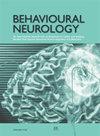严肃游戏在注意力康复中的系统研究及其效果
IF 2.7
4区 医学
Q2 CLINICAL NEUROLOGY
引用次数: 12
摘要
注意是一项基本的、主要的心理任务,对智力、记忆、学习和感知等其他脑功能的运作起着重要作用,80%的创伤性脑损伤患者存在注意缺陷。基于游戏的康复工具的使用正在迅速扩大。通过电子游戏进行认知康复是认知科学领域的一个新兴热点。除了娱乐之外,严肃游戏还有一个特定的目的。它们可能比锻炼更吸引人,因为它们用现实世界的动机取代了奖励和激励系统,作为康复活动的补充。本研究旨在识别和分类用于注意力康复的严肃电脑游戏,并评估其效果。2021年8月检索了6个电子数据库(Scopus、PubMed、ISI、Embase、IEEE和Cochrane)。搜索策略包括“严肃游戏”、“认知缺陷”和“认知康复”三个主要概念。纳入标准是(1)期刊文章,(2)英语,(3)最近10年内发表的文章,(4)人类参与者,(5)基于游戏的干预。在纳入的30项研究中,22种独特的游戏被用于注意力康复。Lumosity(20%)、Brain Age (Dr. Kawashima’s Brain Training)(10%)和MoHRS(6.66%)是这些研究中最常见的游戏。休闲游戏占57%,动作游戏占23%,模拟游戏占10%,多题材游戏占10%。在研究中使用的47种工具中,5种使用跨模态古怪注意力任务,4种使用游戏表现,3种使用节奏听觉系列附加测试(PASAT),其余使用其他工具。共有73项结局指标与注意力相关,42项没有显著结果,30项显著改善,1项显著恶化,4篇文章没有任何具体的注意力评价指标。因此,研究结果揭示了严肃游戏对注意力的积极影响。然而,在设计、开发和使用基于游戏的系统以防止偏倚时,应考虑诸如缺乏科学团队、导致缺陷的疾病的多样性、标准的多样性、测量方法的差异、缺乏长期随访、RCT研究不足和小样本量等问题。本文章由计算机程序翻译,如有差异,请以英文原文为准。
A Systematic Review on Serious Games in Attention Rehabilitation and Their Effects
Attention is a basic and main mental task and can play an important role in the functioning of other brain abilities such as intelligence, memory, learning, and perception, and its deficit occurs in 80% of patients with traumatic brain injury. The use of game-based tools for rehabilitation is rapidly expanding. Cognitive rehabilitation via video games is an emerging hot topic in cognitive science. Serious games serve a specific purpose in addition to entertainment. They can be more engaging than exercises since they replace reward and motivation systems with real-world motivations as a complement for rehabilitation activities. This study was aimed at identifying and categorizing serious computer games used for attention rehabilitation and evaluating their effects. Six electronic databases (Scopus, PubMed, ISI, Embase, IEEE, and Cochrane) were searched in August 2021. The search strategy consisted of three main concepts of “serious game”, “cognitive deficits”, and “cognitive rehabilitation”. The inclusion criteria were (1) journal articles, (2) English language, (3) being published in the last 10 years, (4) human participants, and (5) game-based intervention. In the 30 included studies, 22 unique games were utilized for attention rehabilitation. Lumosity (20%), Brain Age (Dr. Kawashima's Brain Training) (10%), and MoHRS (6.66%) were the most common games among the studies. There were (57%) casual, (23%) action, (10%) simulation, and (10%) multiple genres. Of the 47 tools used in the studies, 5 utilized cross-modal oddball attention tasks, 4 utilized game performance, 3 utilized the paced auditory serial additional test (PASAT), and the rest employed other tools. A total of 73 outcome measures were related to attention, 42 measures did not have significant results, 30 were significantly improved, 1 was significantly deteriorated, and 4 articles did not have any specific measures for attention evaluation. Thus, the results revealed the positive effect of serious games on attention. However, issues such as absence of scientific teams, the variety of the disorders that cause defects, the variety of criteria, differences in measurements, lack of long-term follow-up, insufficient RCT studies, and small sample sizes should be considered when designing, developing, and using game-based systems to prevent bias.
求助全文
通过发布文献求助,成功后即可免费获取论文全文。
去求助
来源期刊

Behavioural Neurology
医学-临床神经学
CiteScore
5.40
自引率
3.60%
发文量
52
审稿时长
>12 weeks
期刊介绍:
Behavioural Neurology is a peer-reviewed, Open Access journal which publishes original research articles, review articles and clinical studies based on various diseases and syndromes in behavioural neurology. The aim of the journal is to provide a platform for researchers and clinicians working in various fields of neurology including cognitive neuroscience, neuropsychology and neuropsychiatry.
Topics of interest include:
ADHD
Aphasia
Autism
Alzheimer’s Disease
Behavioural Disorders
Dementia
Epilepsy
Multiple Sclerosis
Parkinson’s Disease
Psychosis
Stroke
Traumatic brain injury.
 求助内容:
求助内容: 应助结果提醒方式:
应助结果提醒方式:


